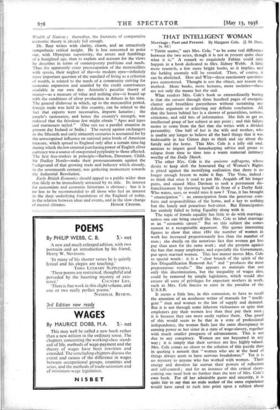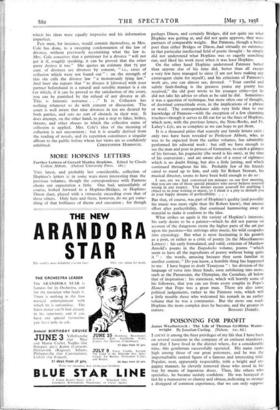THAT INTELLIGENT WOMAN
" THERE seems," says Mrs. Cole, " to be some real difference between the two sexes, though it is not at present quite clear
what it is." A remark so exquisitely Fabian could only happen in a book dedicated to Mrs. Sidney Webb. A little more research, a few more bright books, so it implies, and
the lurking anomaly will be revealed. Then, of course, it can be abolished. 'How and Why—these reactionary questions pass unanswered. Thought is not the object, nor reason the method. More books, more lectures, more societies—these are not only the means but the end.
What renders Mrs. Cole's book so extraordinarily boring is that she careers through three hundred pages of energetic chatter and breathless parentheses without sustaining any definite argument or achieving any definite conclusion. All that she leaves behind her is a shower of generalities, notions, criticisms, and odd bits of information. She fails to get an intellectual grasp of her subject at any point ; and this failure seems to come from the fact that she writes with a divided personality. One half of her is the wife and mother, who is unable any longer to believe all the hard things that it was fashionable in her Girton days to think and say about the family and the home. This Mrs. Cole is a jolly old soul, anxious to impart good housekeeping advice and prone to relapse from time to time into a warm maternal intimacy worthy of the Daily Sketch.
The other Mrs. Cole is the ancienne suffragette, whose desire to keep aloft the honoured flag of Women's Rights is pitted against the mortifying realisation that there is no longer enough breeze to make it flap. The Vote, indeed : to think that once it used to put Mr. Asquith off his longer putts, and caused Miss Davison to seek a permanent dis- franchisement by throwing herself in front of a Derby field. Who wants, uses, or would miss it now ? True, it has brought " emancipation " : an emancipation from the generous com- forts and responsibilities of the home, and a key to nothing but the lonely and penurious bed-sitter. But Emancipation has entirely failed to bring Equality along with it.
The topic of female equality has little to do with marriage, unless one can bring oneself like Mrs. Cole to label marriage as an " economic career." But on this subject she comes nearest to a recognisable argument. She quotes interesting figures to show that since 1881 the number of women in work has increased proportionately less than the number of men ; she dwells on the notorious fact that women get less pay than men for the same work ; and she protests against the ban that many employers, and especially the Government, put upon married women. This last matter moves Mrs. Cole to special wrath : it is a " clear breach of the spirit of the Sex Disqualification Removal Act " and " produces the most preposterous results." She appears to maintain that not only this discrimination, but the inequality of wages also, could be removed by simple legislation, which would also ensure all sorts of privileges for expectant mothers in work, such as Mrs. Cole fancies to exist in the paradise of the U. S.S . R.
It seems a little late, in this connexion, to have to recall the attention of an assiduous writer of manuals for " intelli- gent " men and women to the law of supply and demand. But it is not through some inherent viciousness or spite that employers pay their women less than they pay their men ; it is because they can more easily replace them. One proof of this would seem to be that in a state of professional independence, the woman finds just the same discrepancy in earning power as her sister in a state of wage-slavery, together with much smaller prospects of advancement. This is not due to any conspiracy. Women are not boycotted in any way; it is simply that their services are less highly valued. Mrs. Cole comes no closer to the solution of this puzzle than in quoting -a remark that " women who are at the head of things always seem to have nervous breakdowns." Yet it is no mystery to anyone who has worked with women. Their energy and devotion far outrun their powers of reflection and self-control ; and for an instance of this critical short- coming one need look no further than the text of Mrs. Cole's own book. For all her admirable gusto and sincerity, it is quite fair- to say that no male author of the same experience would have cared to rush into print upon a subject about
which his ideas were equally imprecise and his information imperfect.
Few men, for instance, would commit themselves, as Mrs. Cole has done, to a sweeping condemnation of the law of divorce, without previously ascertaining what the law is. Mrs. Cole conceives that a petitioner for a divorce " will not get it if, roughly speaking, it can be proved that the other party desires it too." She quotes an estimate that 75 per cent, of divorces are divorces by consent, " i.e., cases of collusion which were not found out " : on the strength of this she calls the divorce law " a monstrously lying law." And later she repeats that " to discuss it [divorce] with your partner beforehand in a natural and sensible manner is a sin for which, if it can be proved to the satisfaction of the court, you can be punished by the refusal of any divorce at all. This is fantastic nonsense . ." It is. Collusion has nothing whatever to do with consent or discussion. The court is well aware that nine divorces in ten are desired by both parties, and sets no sort of obstacle in their way. It does attempt, on the other hand, to put a stop to fakes, bribes, threats, and other abuses to which the collective name of collusion is applied. Mrs. Cole's idea of the meaning of collusion is not uncommon ; but it is usually derived from the reading of novels, and its repetition constitutes a singular affront to the public before whom her views are so confidently















































 Previous page
Previous page